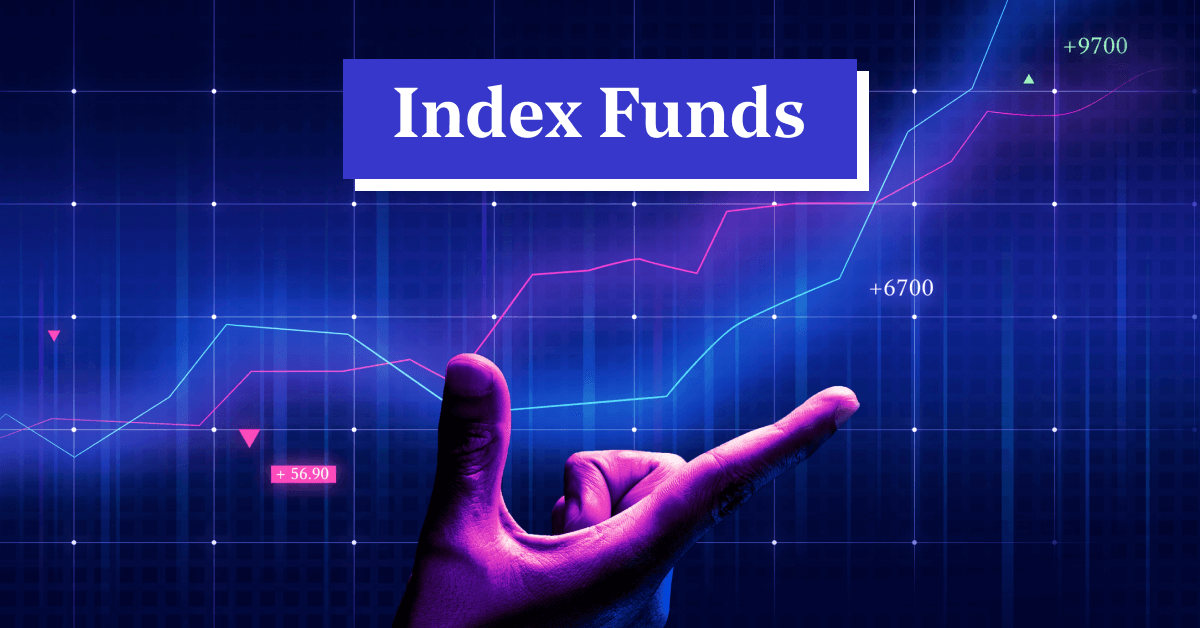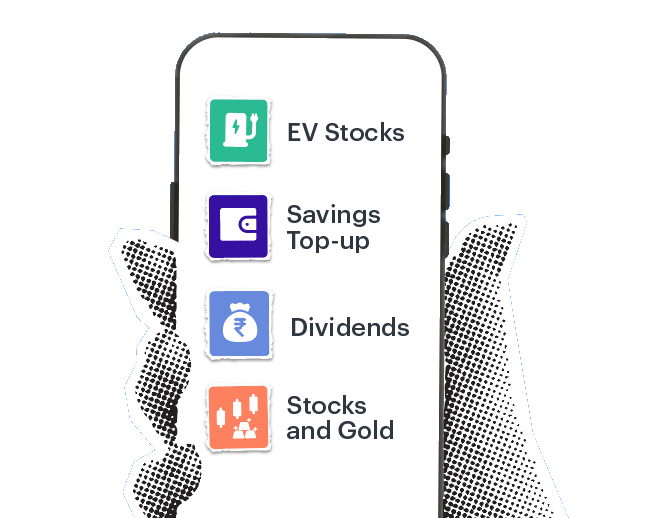What are Index Funds? Learn their Investment Benefits, Example & Stock Market Cost

There is no one right way to choose between various investment options – but if you were to take the advice of the world’s most famous investor, Mr. Warren Buffett would recommend that you focus on costs and invest in low-cost index funds. So much so that this is exactly the instruction he has left in his will in order to manage his wife’s money after his death!
Index funds have become increasingly popular among investors in recent years due to their low costs and consistent returns. They’re an excellent pick to diversify your portfolio investing. In this guide, we’ll cover everything you need to know about index funds meaning including how they work, index returns, their advantages, and how to invest in them.
What is Index Fund in India?
Index Funds are a type of mutual fund that tracks a specific stock market index, such as the S&P 500. Thus, the method of investing in an index fund is called index fund investing.
The goal of index investing is to replicate the underlying index’s returns rather than try to outperform it, which means the investor holds the same stocks in the same proportion as the index. This is in contrast to actively managed funds, where a fund manager picks and chooses individual stocks to include in the fund.
These funds are constructed by purchasing all the stocks in the tracking index, which means they’re more passive than actively managed funds. This also means they have lower operating costs since there’s no need to pay a fund manager to make investment decisions.
How are Index Funds Different From ETFs?
Index funds are also mutual funds, similar to ETFs. The difference between the former and an ETF is that the latter trades on stock exchanges, and you need a Demat account to invest in it. An index fund India can be invested in without a Demat account through the mutual fund company or a fund distributor. This comes at an added cost, though, which is why the expense ratio of an index fund is higher than that of an ETF.
How Do Index Funds Work?
They track the returns of an index by investing in exactly the same stocks as in the index and with exactly the same weightage. For example, if the Nifty-50 has Infosys with a 6% weightage, the index fund that tracks the Nifty-50 will also have Infosys as 6% of its portfolio. This way, these generate returns that are almost identical to those of the index.
The goal of this fund is to provide returns consistent with the benchmark index they’re tracking. This means that if the index goes up, the value of the index fund should also go up, and if the index goes down, the fund’s value should also go down.
Index Funds India may not require a team of researchers and portfolio managers to monitor the market constantly, which allows them to reduce costs significantly. As such, they can be cheaper than most mutual funds – the difference being as low as 0.10% TER for certain passive funds & TERs of 1.50-2.25% for many active mutual funds.
Index Fund Example
Index funds have been around since the 1970s, but have experienced a surge in popularity over the last decade. The attraction of passive investing, low fees, and prolonged bull market have led to their significant growth. Thus, the examples of index funds in India are Nifty 50 funds (e.g., UTI Nifty Next 50), Sensex funds (e.g., HDFC Sensex), Midcap/Smallcap funds (e.g., Nippon India Nifty SmallCap 250) – all passively track market indices, offering broad market exposure.
Best Index Fund Investments in India
Let’s have a look at how does investing in index funds India can be helpful for you to select.
| Name | AUM (in Cr) | Expense Ratio | 3Y Return |
|---|---|---|---|
| Sundaram Nifty 100 Equal Wgt Dir Gr | ₹62 | 0.57% | 0.57% |
| Nippon India Nifty Next 50 Junior BeES FoF | ₹207 | 17.14% | 0.26% |
| DSP Nifty Next 50 Index Fund | ₹297 | 17.27% | 0.3% |
| LIC MF Nifty Next 50 Index Fund | ₹53 | 17.23% | 0.32% |
| Bandhan Nifty 100 Index Fund | ₹85 | - | 0.11% |
| Axis Nifty 100 Index Fund | ₹972 | 17.06% | 0.16% |
| HDFC Nifty 100 Index Fund | ₹110 | - | 0.3% |
| Nippon India Index S&P BSE Fund Sensex Plan | ₹536 | 16.55% | 0.18% |
| HDFC Index S&P Fund Sensex Plan-Direct Plan | ₹5493 | 16.52% | 0.2% |
| ICICI Prudential S&P BSE Sensex Index Fund Direct Growth | ₹1120 | 16.14% | 0.16% |
Disclaimer: Please note that the above list is for educational purposes only, and is not recommendatory. Please do your own research or consult your financial advisor before investing.
Note: The data on the top index funds in India in the list is from 12th March 2024. However, for real-time updates on stock prices and market trends, visit the smallcase stocks collection today!
Top Index Funds in India Overview
Let’s discuss and understand the top index funds in India below:
Sundaram Nifty 100 Equal Wgt Dir Gr
This fund tracks the Nifty 100 Equal Weight Index, offering diversified exposure to the top 100 companies listed on the NSE with an equal weightage strategy.
Nippon India Nifty Next 50 Junior BeES FoF
Aiming to replicate the performance of the Nifty Next 50 Index, this Fund of Funds (FoF) focuses on the next 50 large-cap stocks, offering growth potential beyond the Nifty 50.
DSP Nifty Next 50 Index Fund
This fund mirrors the Nifty Next 50 Index, comprising promising mid-cap companies. It allows investors to participate in the growth of the next tier of Indian companies.
LIC MF Nifty Next 50 Index Fund
To replicate the Nifty Next 50 Index, this fund allows investors to tap into the growth potential of emerging companies listed on the NSE.
Bandhan Nifty 100 Index Fund
Designed to match the performance of the Nifty 100 Index, this fund provides exposure to the top 100 companies on the NSE, making it an ideal choice for investors seeking a broad market representation.
Axis Nifty 100 Index Fund
This fund closely tracks the Nifty 100 Index, offering investors a convenient way to invest in the top 100 companies on the NSE to achieve long-term capital appreciation.
HDFC Nifty 100 Index Fund
Seeking to replicate the Nifty 100 Index, this HDFC fund allows investors to participate in the growth potential of the largest and most liquid stocks listed on the NSE.
Nippon India Index S&P BSE Fund Sensex Plan
This fund, focused on mirroring the performance of the S&P BSE Sensex Index, provides exposure to the 30 large and well-established companies listed on the Bombay Stock Exchange (BSE).
HDFC Index S&P Fund Sensex Plan-Direct Plan
To track the S&P BSE Sensex Index, this fund from HDFC offers investors an opportunity to invest in the leading companies listed on the BSE for potential long-term returns.
ICICI Prudential S&P BSE Sensex Index Fund Direct Growth
This fund seeks to replicate the performance of the S&P BSE Sensex Index, providing investors with exposure to the top 30 companies listed on the BSE and their growth prospects
What are the Types of Index Funds?
Here are the types of index funds in India.
- Nifty 50 Index Funds: These funds replicate the Nifty 50 Index, representing the top 50 large-cap companies listed on the National Stock Exchange (NSE) of India.
- Nifty Mid Cap Index Funds: These funds track the Nifty Midcap 150 Index, which is composed of mid-sized companies listed on the NSE with market capitalization between large and small caps.
- Sensex Index Funds: These funds mirror the performance of the Sensex, or BSE 30, tracking the top 30 companies listed on the Bombay Stock Exchange (BSE).
- Nifty Small Cap Index Funds: These funds imitate the Nifty Smallcap 250 Index, encompassing smaller companies listed on the NSE, generally having smaller market capitalization than mid and large caps.
- Global Index Funds: These funds seek to replicate the performance of global indices, offering exposure to international markets. Examples include the S&P 500 for the U.S. market or the MSCI World Index for a global perspective.
Factors to Consider Before Investing in Index Funds in India
Here are some of the important factors that you must consider before investing in top index funds in India.
- Risk and Returns: Index funds, tracking market indices, offer lower volatility and risks compared to actively managed equity funds. During market upswings, index funds show favourable returns, but switching to active funds is advisable during market downturns.
- Expense Ratio: The appeal of index funds with the lowest expense ratio is a small percentage of total assets. Passively managed, index funds eliminate the need for extensive research and strategies, resulting in lower management costs and a reduced expense ratio.
- Investment Horizon: Index funds suit investors with a horizon of seven years or more, as short-term fluctuations tend to average out over an extended period. However, with a long-term perspective, investors can anticipate 10-12% returns, aligning these funds with their extended investment goals.
- Tax Implications: While index funds typically generate fewer capital gains than actively managed funds, understanding the tax landscape is essential for effective tax planning.
How to Invest in Index Funds India?
To answer how to buy index funds in India, you first need to open an investment account with a brokerage firm or a financial advisor. Most online brokers offer commission-free trading for index funds, making it easy and affordable for investors to get started. Next, enter the ticker symbol of the fund you want to invest in and the amount you want to invest. Finally, review your order and click “submit.” When choosing an index fund, it’s essential to consider several factors, including the fund’s expense ratio, tracking error, and diversification. Some of the top index funds in India include the Nifty 50 Index Fund, BSE Sensex Index Fund, and S&P BSE 500 Index Fund.
Why Should You Invest in Index Funds?
With lower management fees compared to actively managed funds, index funds often deliver cost-effective, long-term investment options. Additionally, they offer simplicity and stability, making them suitable for both novice and seasoned investors. The passive management approach ensures minimal turnover, reducing transaction costs. Overall, index funds provide a straightforward and low-cost way to participate in the broader market’s growth with the potential for competitive returns.
Who Should Invest in Index Funds?
Since Index Funds track a market index, the returns are quite similar to those the index offers. Hence, investors seeking consistent returns and aiming to invest in lower-risk stock markets often choose these funds. In actively managed funds, the fund manager adjusts the portfolio composition based on the performance of the underlying securities. This surely adds an element of risk. Since index funds are managed passively, such risks may arise. However, investors aiming for higher returns may prefer actively managed equity funds.
What are the Costs Associated with Index Funds?
Index funds are known for their cost-effectiveness due to their passive management strategy. The main costs associated with index funds are typically lower expense ratios than actively managed funds. Expense ratios cover the fund’s operational and management expenses. Since index funds aim to replicate the performance of a specific market index, they require less active management, resulting in lower operating costs. Additionally, investors might face minimal transaction costs as index funds have lower portfolio turnover.
Benefits of Investing in Index Funds in India
There are several advantages to investing in top index funds in India, including:
- Often Increase Over Time: Despite the ups and downs of individual equities, indexes often increase over time. You won’t earn bull gains with index funds during a bad market. However, even if one of your investments fails as the market soars, you won’t lose money on it.
- Low Fees: Since index funds need less labour than managed accounts, their expense ratios—also known as the cost of commissions and the cost of account management—are lower.
- Aids with Portfolio Diversification: Index funds, like other mutual funds, distribute risk across a wider variety of assets, including both conservative and risky ones, as well as a wider variety of industries and asset classes. smallcase, too, helps you with portfolio diversification as you can invest in 500+ readymade portfolios of stocks/ETFs.
- Easy to Comprehend: Index funds offer a “what you see is what you get” aspect, whereas investing methods can be quite complicated
Limitations of Investing in Index Funds in India
Now that we have discussed the advantages, let’s have a look at the limitations below:
- Lack of Alpha: Index funds passively track benchmark indices, aiming to match their performance, not beat them. This means they won’t outperform the market and potentially miss out on opportunities for higher returns.
- Limited Control: You don’t have any control over the individual stocks held in the fund, as the underlying index dictates the composition. This can be less appealing to investors who prefer actively managing their portfolio selections.
- Tracking Error: Although index funds aim to mimic the index, they may experience slight deviations in performance due to factors like tracking methodology, expense ratios, and cash drag.
- Downside Exposure: During market downturns, index funds can experience losses just like the underlying index. This can be risky for investors seeking downside protection or capital preservation during volatile periods.
Taxation on Index Funds
As equity funds, index funds are liable to dividend distribution tax (DDT) and capital gains tax.
Equity Index Funds
- Short Term (Less than 1 year): Profits from selling within a year are considered Short Term Capital Gain (STCG) and taxed at 15%
- Long Term (More than 1 year): Holding for more than three years categorises the profit as Long-Term Capital Gain (LTCG), taxed at 20%, with indexation benefits
Debt Index Funds
- Short Term (Less than 3 years): Selling within three years adds the profit to your taxable income, taxed at your regular rate.
- Long Term (More than 3 years): Holding for over three years categorises the profit as Long Term Capital Gain (LTCG), taxed at 20%, with indexation benefits.
Misconceptions
There are several misconceptions about index funds. Let’s examine these misconceptions and why they are false.
Misconception 1: Not Diverse Enough
Index funds are designed to expose investors to a broad range of stocks or bonds, making them highly diversified. For example, an S&P 500 fund holds 500 of the largest publicly traded companies in the U.S., representing various sectors and industries.
Misconception 2: Not Actively Managed
While index funds do not rely on active management to select individual stocks or bonds, they still require careful management to track the index accurately. Fund managers must rebalance the portfolio periodically to maintain its alignment with the underlying index.
Misconception 3: Not as Profitable as Actively Managed Funds
While some actively managed funds may outperform index funds in the short term, numerous studies have shown that index funds tend to outperform actively managed funds over the long term. Additionally, they typically have lower fees, which can significantly impact an investor’s returns over time.
To Wrap It Up…
Investing in index funds is an excellent way for investors to gain exposure to a diversified portfolio of stocks or bonds at a low cost. By following the steps outlined in this blog, investors can easily invest in them and take the first step towards building a successful investment portfolio.
FAQs
A good index fund accurately tracks a market index, has a low expense ratio, and minimal tracking error. It offers broad market exposure and stability and is aligned with an investor’s financial goals.
Based on the 3-year return as of 27th Dec, 2023 tops the list by offering a 19.7% return with a 0.57% expense ratio. While Nippon India Nifty Next 50 Junior BeES FoF provides a 17.41% return with 0.26% expense ratio. However, it’s important to do your own research and/or consult a financial advisor before investing.
Yes, index funds are suitable for SIP (Systematic Investment Plan). SIP in index funds allows investors to benefit from rupee cost averaging, ensuring gradual investment in a diversified portfolio over time.
Debt investments for index funds are rare. Thus, this can happen in index funds when it is based on hybrid indices that have both equity and debt allocation.
Index funds are mutual funds that passively track a specific market index. In contrast, mutual funds encompass various types, including actively managed funds where fund managers make investment decisions.
Mutual Funds Investments Guides on smallcase –
All about mutual funds, it’s types, taxation, NAV, apps for mutual funds just one click away, start your mutual funds and SIP Journey today on smallcase.






























































